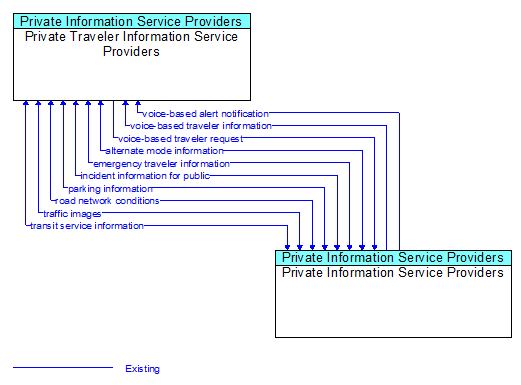Interface: Private Traveler Information Service Providers - Private Information Service Providers

Architecture Flow Definitions
alternate mode information (Existing)
Schedule information for alternate mode transportation providers such as air, ferry, and passenger–carrying heavy rail.
emergency traveler information (Existing)
Public notification of an emergency such as a natural or man–made disaster, civil emergency, or child abduction. This flow also includes evacuation information including evacuation instructions, evacuation zones, recommended evacuation times, tailored evacuation routes and destinations, traffic and road conditions along the evacuation routes, traveler services and shelter information, and reentry times and instructions.
incident information for public (Existing)
Report of current desensitized incident information prepared for public dissemination.
parking information (Existing)
General parking information and status, including current parking availability.
road network conditions (Existing)
Current and forecasted traffic information, road and weather conditions, and other road network status. Either raw data, processed data, or some combination of both may be provided by this flow. Information on diversions and alternate routes, closures, and special traffic restrictions (lane/shoulder use, weight restrictions, width restrictions, HOV requirements) in effect is included.
traffic images (Existing)
High fidelity, real–time traffic images suitable for surveillance monitoring by the operator or for use in machine vision applications. This flow includes the images and meta data that describes the images.
transit service information (Existing)
Transit service information including routes, schedules, and fare information as well as dynamic transit schedule adherence and transit vehicle location information.
voice-based alert notification (Existing) Applicable ITS Standards
Information to be distributed to the traveling public via voice regarding a major emergency such as a natural or man–made disaster, civil emergency, severe weather or child abduction. The flow may identify the alert originator, the nature of the emergency, the geographic area affected by the emergency, the effective time period, and information and instructions necessary for the public to respond to the alert. The content of this architecture flow may be specially formatted for voice–based traveler information.
voice-based traveler information (Existing) Applicable ITS Standards
Traveler information sent to the telecommunications systems for traveler information terminator. This flow may represent the bulk transfer of traveler information, including traffic conditions, incident information, transit information and weather and road condition information. It may be specially formatted for voice–based traveler information.
voice-based traveler request (Existing) Applicable ITS Standards
The electronic traveler information request from the telecommunications systems for traveler information terminator. It may be specifically formatted for voice–based traveler requests. The request can be a general subscription intended to initiate a continuous or regular data stream or a specific request intended to initiate a one–time response from the recipient.